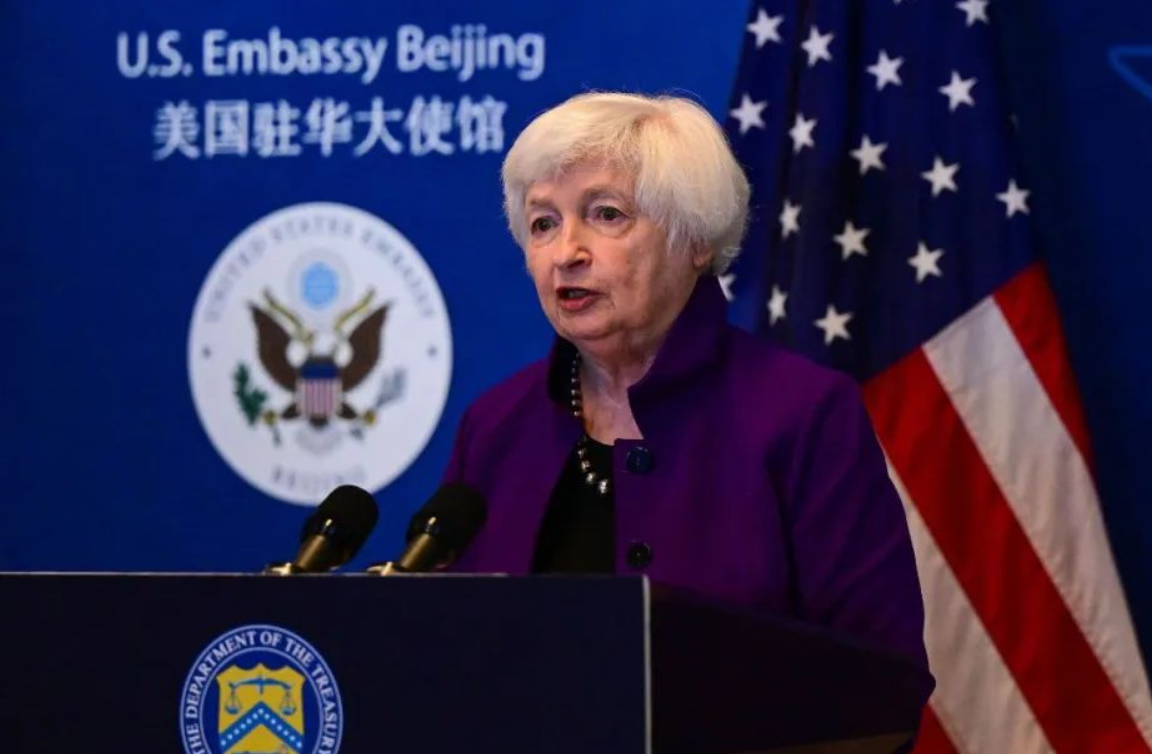
Rhetoric and Reality
“I believe that my bilateral meetings — which totaled about 10 hours over two days — served as a step forward in our effort to put the U.S.-China relationship on surer footing,” Secretary of the Treasury Janet Yellen said in a press briefing in Beijing. “President Biden and I do not see the relationship between the U.S. and China through the frame of great power conflict — we believe that the world is big enough for both of our countries to thrive.” Yellen touched based with the key players concerned with China’s finance and trade as well as with the premier and vice premier. With a number of corporate CEOs beside her, she presented a list of grievances, such as Chinese subsidies of state-owned firms, barriers to market access, and police intrusions in corporate offices.
In Beijing, Yellen repeated a point she has emphasized before: “A decoupling of the world’s two largest economies would be destabilizing for the global economy, and it would be virtually impossible to undertake.” But she’s all for “diversifying” trade, which is code for the Biden administration’s attempts to deprive China of advanced chips. That goal is being pursued on two fronts. Domestically, U.S. policy is to subsidize building more semiconductor facilities at home, preventing the export of advanced semiconductor technology to China, stopping any U.S. company that will benefit from government subsidies of its chip making from investing in China, and restricting Chinese companies’ access to U.S. cloud computing services to curtail China’s use of advanced chips for artificial intelligence. On the international front, the U.S. is urging (i.e., pressuring) companies in allied nations to refrain from providing China with advanced technology. One of them is Netherlands, which recently decided to ban high-tech machinery sales to China.
China’s Counterpoint
The Chinese aren’t fooled by shifts in language. Decouple, de-risk, diversify—they’re all the same to them. Official comments traversed old ground—reminders to the U.S. of the need for mutual respect and a win-win approach, warnings against U.S. “hegemony and bullying,” and emphasis on mutual benefit in economic relations. The finance ministry’s assessment of the meeting indicated ongoing dissatisfaction with U.S. economic policy, which it said failed to recognize that China’s development is a mutual opportunity; with U.S. trade policy’s reliance on sanctions; and with understanding China’s position on “healthy economic competition.” Beijing can retaliate, and in the Netherlands case it did, stopping export of two minerals that are important in chip manufacture. Those export controls could be applied to the U.S. as well as to other U.S. allies that go along with the Netherlands, such as Japan and South Korea.
The positive news is that Beijing wants dialogue to continue. In its statement, the finance ministry described the meetings with Yellen as “candid, practical, deep, and constructive.” “China hopes the U.S. will adopt a rational and practical attitude, move along in step with China, commonly exert efforts, and push forward putting China-U.S. relations on the right track at an early date, just like the consensus of the two countries’ leaders at the Bali meeting shifted to practical action.” The final sentence in the statement reads: “At this time of treasury secretary Yellen’s visit, both sides agree that in accordance with the common understanding reached by the two countries’ leaders at Bali, they will follow up by maintaining high-level exchanges and communication channels at various levels in the China-U.S. economic field.”
More Dialogue Ahead
In short, Yellen’s trip helped promote dialogue, and possibly smoothed some feathers, but it did little to resolve outstanding issues with China. So far as I can tell, Yellen didn’t bring any new proposals to the table. And it’s easy to imagine that her complaints about the treatment of U.S. corporations fell on deaf ears, just as Chinese complaints probably did on American ears.
More U.S. officials will follow her, starting with John Kerry (July 16-19) for talks on the climate crisis with his counterpart, Xie Zhenhua. That meeting may reactivate the U.S.-China joint working group on climate cooperation, which has not met since last August. It won’t be an easy meeting for several reasons. First, Kerry is under pressure from the Republicans not to do anything that might compromise U.S. security or values—a catch-all category that is actually intended to keep him from agreeing to anything. Second, the Chinese side will have to explain the continued reliance on coal. China’s coal capacity is over half the world’s capacity, and coal remains a key source of electricity—and therefore of carbon emissions. While the U.S. leads the world in global warming emissions on a per person basis, China (according to a report last year from the U.S.-based Rhodium Group) accounts for 27 percent of global emissions. That puts China far ahead of the next several top emitters, starting with the U.S. (11 percent), India (6.6 percent), and the European Union (6.4 percent).
We’re not back to square one in U.S.-China relations, but neither have we moved the needle much forward. We await a modest initiative from each side: China’s agreement to restore military-to-military talks, for instance, and U.S. agreement to halt high-level visits to Taiwan. Consistent dialogue is important, but if mutual security is the aim, dialogue needs building blocks of mutual benefit. You can only talk about more dialogue, and dialogue about more talking, for so long.
